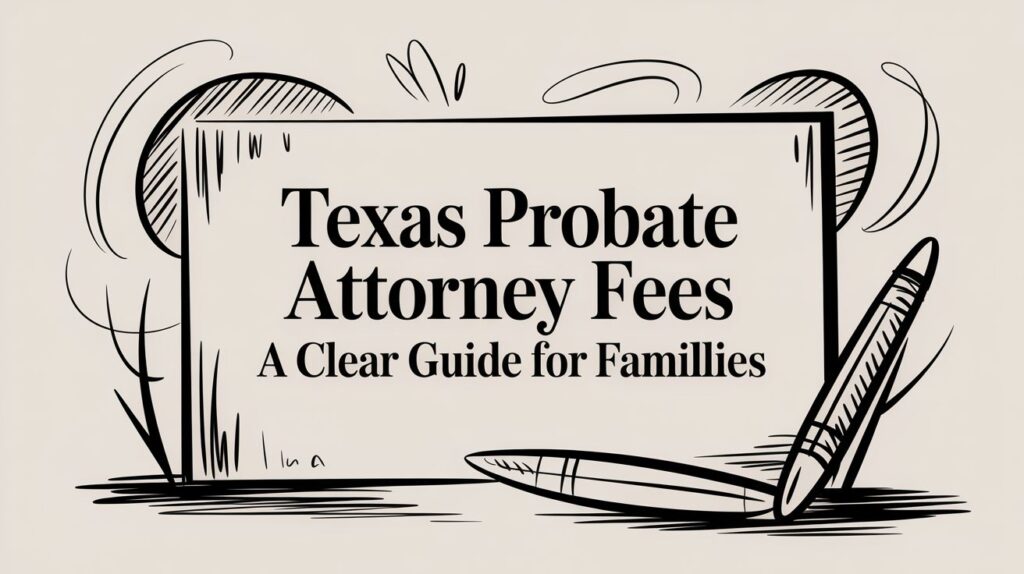Probating a will in Texas is a legal process that ensures a deceased person’s assets are distributed according to their wishes. But what does it mean to probate a will in Texas? Simply put, probate is the court-supervised procedure of validating a will, settling debts, and transferring property to heirs. Understanding the probate process can help you navigate Texas’s legal system more efficiently and avoid unnecessary delays.
Understanding the Basics of Probate in Texas
What Is Probate?
Before diving into the intricacies of Texas probate law, it’s essential to understand what probate is and why it exists. When someone passes away, their estate—including property, finances, and other assets—must be managed and distributed. Probate serves as a legal framework that ensures this process is carried out fairly, following the deceased person’s final wishes as outlined in their will.

Probate exists to provide structure and oversight in estate administration. Without it, there would be no legal mechanism to validate a will or transfer assets legally. This could lead to disputes among heirs, fraudulent claims on property, and creditors left unpaid. The probate court acts as an arbiter, ensuring transparency and adherence to legal requirements while protecting the interests of both beneficiaries and creditors.
The Flexibility of Texas Probate Law
Additionally, Texas probate law offers a degree of flexibility that many other states do not. Texas provides multiple probate options depending on the complexity and value of an estate:
- Independent Administration – Allows for minimal court supervision, expediting the process and reducing legal costs.
- Dependent Administration – Required when disputes arise, necessitating court approval for various financial transactions.
Understanding these nuances can help individuals plan their estates more efficiently and select probate alternatives when possible.
The Role of the Executor in Probate
Another important aspect of probate in Texas is the role of the executor. The executor, appointed in the will, is responsible for ensuring:
- The deceased’s wishes are carried out.
- All outstanding debts are settled.
- Remaining assets are distributed appropriately.
If no executor is named, the court may appoint an administrator to perform these duties. Executors have a fiduciary responsibility, meaning they must act in the best interest of the estate and beneficiaries. This involves:
- Maintaining accurate records.
- Keeping beneficiaries informed.
- Ensuring assets are managed properly until distribution.
Challenges That Can Arise in Probate
Understanding the basics of probate also includes recognizing the potential challenges that can arise. Probate disputes are not uncommon and can include:
- Will contests – A party may claim the will is invalid due to fraud, undue influence, or lack of mental capacity.
- Disagreements over asset distribution – Heirs may dispute the manner in which assets are divided.
Knowing the possible hurdles ahead can help executors and heirs navigate the probate process more smoothly and, in some cases, take proactive steps to minimize disputes.
When Probate Is Required in Texas
The necessity of probate in Texas depends on multiple factors, including the total value of the estate, the existence of a legally valid will, and the manner in which assets are titled. In Texas, probate becomes mandatory under the following conditions:
1. The Decedent Owned Real Property Solely in Their Name
When the deceased owned real estate solely in their name, the title does not automatically pass to an heir. Probate is required to determine the rightful beneficiary of the property. Without probate, the property may remain legally unsettled, preventing any sale or transfer of ownership. This issue can be particularly challenging for families who need to liquidate assets quickly to cover funeral expenses or outstanding debts.
2. The Estate’s Assets Exceed the Small Estate Limit
Texas allows a simplified probate process for estates valued at $75,000 or less, known as the Small Estate Affidavit. However, if the estate surpasses this limit, a formal probate process is generally necessary to ensure the proper distribution of assets. Probate ensures that all heirs receive their rightful shares and helps avoid disputes over property or financial holdings. Without probate, conflicts may arise among heirs regarding asset ownership, potentially leading to prolonged legal battles.
3. The Deceased Had Outstanding Debts
If the deceased left behind unresolved debts, probate serves as the mechanism to settle these obligations before any remaining assets are distributed to heirs. Creditors may file claims against the estate, necessitating a court-supervised process to determine the legitimacy of such claims. Probate provides a structured approach to handling financial obligations fairly and prevents heirs from inheriting property burdened with unresolved debts, which could create unexpected financial challenges.
4. The Will Must Be Validated
In cases where the validity of the will is questioned, or the will does not meet Texas’s legal requirements, probate is essential to confirm its authenticity and enforce its terms. Sometimes, heirs may challenge a will by alleging undue influence, fraud, or lack of mental capacity. The probate court investigates such claims to determine the deceased’s true intentions. This process is crucial in preventing fraudulent or coerced alterations of a will from taking effect.
5. The Deceased Had No Beneficiary Designations on Certain Accounts
Certain financial assets, such as life insurance policies, retirement accounts, and payable-on-death (POD) bank accounts, typically bypass probate if designated beneficiaries exist. However, if no beneficiaries are named, probate proceedings may be required to establish the rightful heirs. Without probate, these financial accounts may remain unclaimed or entangled in legal disputes, delaying inheritance and potentially diminishing the estate through legal fees and administrative expenses.
The Steps to Probate a Will in Texas
Once probate is deemed necessary, the process follows a structured series of steps. Understanding these steps can help executors and beneficiaries prepare for the legal requirements involved.
Step 1: File an Application for Probate
The executor or another interested party must file an application for probate in the county court where the deceased resided. This application asks the court to recognize the will and formally appoint an executor. The filing must occur within four years of the deceased’s passing, or the will may be considered invalid. Seeking legal guidance is recommended to ensure all required documentation is correctly submitted, preventing unnecessary delays.
Step 2: Notify Interested Parties
Texas law mandates that all interested parties, including heirs and creditors, receive formal notification of probate proceedings. This requirement ensures that anyone with a legitimate claim to the estate has an opportunity to assert their interests. Notices may be published in local newspapers or directly sent to known parties to preempt future disputes. Failure to properly notify interested parties could lead to legal challenges that extend the probate process.
Step 3: Validate the Will in Court
A probate hearing is held to verify the will’s authenticity. If the will is self-proving—meaning it was properly signed and witnessed according to Texas law—the process is typically straightforward. If not, witnesses may need to testify regarding the will’s validity. This step ensures that no fraudulent or contested documents are enforced. In certain cases, handwriting experts or other professionals may be called upon to verify signatures and confirm authenticity.
Step 4: Appoint the Executor
Once the court determines the will is valid, it officially appoints the named executor. The executor then receives Letters Testamentary, granting them the legal authority to manage the estate. The executor must act in the best interests of the beneficiaries and adhere to Texas probate laws. Their responsibilities include making informed financial decisions, safeguarding estate assets, and ensuring all obligations are met in a timely manner.
Step 5: Identify and Inventory Estate Assets
The executor must create a comprehensive inventory of the deceased’s assets, including real estate, bank accounts, investments, and personal property. This inventory is then submitted to the court for review. This process ensures that all estate assets are properly accounted for before distribution. In certain situations, estate appraisers may be hired to determine the fair market value of specific assets.
Step 6: Settle Debts and Pay Taxes
Before distributing assets to beneficiaries, the executor must settle any outstanding debts, including medical bills, loans, and taxes. If the estate lacks sufficient funds to cover debts, Texas probate law dictates the order in which creditors are paid. Ensuring all debts are resolved prevents potential legal actions against the estate. Effective financial management during this stage helps preserve estate value and minimizes unnecessary losses.
Step 7: Distribute Remaining Assets to Beneficiaries
After debts and obligations are settled, the executor distributes the remaining assets to the beneficiaries in accordance with the will. Once all distributions are completed, the executor submits a final accounting report to the court to officially close the probate case. This final report ensures transparency and accountability for all involved parties, confirming that the estate has been properly managed and closed without unresolved claims.
Key Takeaways for Efficient Probate in Texas
Understanding the probate process in Texas is essential for executors, heirs, and those involved in estate planning. Whether probate is required depends on factors such as estate size, asset titling, and outstanding debts. By familiarizing yourself with Texas probate laws and available alternatives, you can navigate the system more efficiently and ensure a smoother transition of assets. If you are uncertain about probate proceedings, consulting a Texas probate attorney can provide valuable guidance and help avoid potential legal complications. Taking proactive estate planning measures now can save your loved ones significant time, money, and legal challenges in the future.








